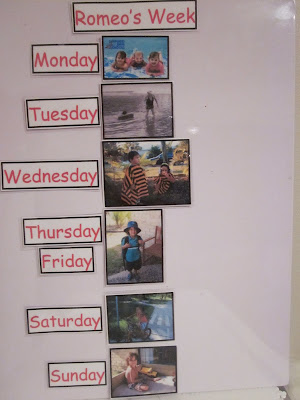
What is a routine? A routine is any activity that we do automatically on a daily basis.When children grow up without routines, duties and limits, they grow up in an uncontrolled manner and become difficult to manage.
- Increased performance at school
- Sense of self-security
- Ability to work in organised fashion
- Ability to learn and keep healthy habits
Our biggest responsibility as parents is to provide a structured and nurturing environment in which our children can become prepared for life as an adult. It is critical that we stimulate our children's minds, social skills, emotions and bodies. Routines play an integral part in this stimulation, ensuring that children understand and embrace their duties and receive the nurturing and care that is so important to them.
I am a big advocate both as a mother, and a teacher that routines influence children’s emotional, cognitive, and social development. Predictable and consistent schedules in preschool classrooms help children feel secure and comfortable. Also, routines help children understand the expectations of the environment and reduce the frequency of behaviour problems, such as tantrums and acts of aggression.Consistent routines are an effective tool that parents can use to prepare their children for life, and to accomplish the stimulation and teaching that is so important to their development.
You could have a routine for:
Getting ready in the morning
Going to bed at night
Eating meals
Hygiene and health – for example, brushing teeth, washing hands
Using family resources like the computer and telephone
Pocket money, given at a regular time and day
Homework
Quiet time each evening
Hobbies
Sports/exercise
Household responsibilities...
Tidying up, looking after toys
Caring for pets
Looking after clothes and laundry
Chores – for example, setting the dinner table, packing away, unpacking the dishwasher
Shopping
Interacting and fun...
Greetings and goodbyes
Eating meals together
Regular play and talk times with a parent each day
Taking turns in talking with family members about their day
Special one-on-one time with a parent
Special weekly meals (such as pancakes on Sunday night or cooked breakfast Saturday morning)
Family days (family activity)
Family DVD nights
Family meetings
Annual events
Story time (book reading)
Social, religious and cultural...
Regular ‘play dates’
Regular contact with your extended family and friends
National/state/local celebration days, annual fetes or outings
Saying prayers
Observing religious events
I admit that there are times that I am having a hard time in making my children follow daily routines and how I wish that they would soon realize that mom is sometimes tired because of work and I need them to do me a little favor.
ReplyDeleteToy stores
google 3949
ReplyDeletegoogle 3950
google 3951
google 3952
google 3953